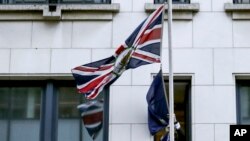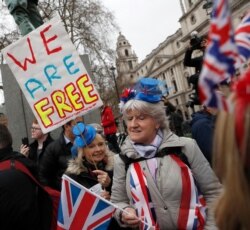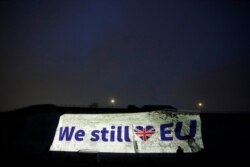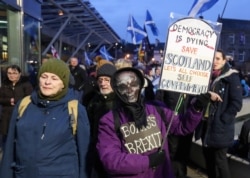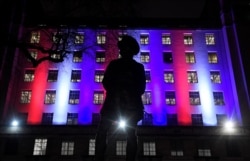For Brexiters there’s delight.
For Britons who never wanted to leave the European Union — and hoped to stop the departure — there’s just resentment and disappointment.
Britain formally relinquished membership of the EU at 11 p.m. local time Friday, marking the conclusion to nearly four years of bitter political infighting since Britons voted by a slim majority to leave the bloc after 47 years of membership.
Brexit comes after two general elections and the ouster of two prime ministers. British politics has been reshaped by Brexit divisions.
Hundreds of Brexiters crowded into Parliament Square outside the House of Commons to toast the historic moment Britain broke its ties to the bloc.
And across the rest of the country, a series of events including marches, celebrations and candlelight vigils was held by jousting Brexiters and pro-EU demonstrators.
Prime Minister Boris Johnson said Friday marks “the moment when the dawn breaks and the curtain goes up on a new act.”
He said the divorce from Brussels was “a moment of real national renewal and change” and “not an end, but a beginning.”
In a tweet, Johnson promised, “This government will unite and level up our country.” He added, “As we build a new relationship with the EU, I urge everyone to find closure and let the healing begin.”
Brexit Party leader Nigel Farage said, “At last the day comes when we break free. A massive victory for the people against the establishment.”
Deep divisions
But even as Britain left the EU, the country appeared as deeply split as ever over the issue of EU membership, with Brexiters and so-called Remainers trading insults on social media and reprising arguments they made during the 2016 referendum.
The rift was summed up by two very different newspaper front pages. The Daily Mail published the headline: “A NEW DAWN FOR BRITAIN” in all caps. The pro-EU Guardian proclaimed Britain a “Small island.” The paper warned Brexit amounts to the biggest gamble in a generation.
Few had predicted the referendum would be won by the Brexit side.
In 2013, then-British Prime Minister David Cameron sought to placate a Brexit faction in his ruling Conservative party by promising to hold a plebiscite on EU membership — not thinking that it would result in Britain exiting the bloc. Remainers say the referendum was blighted by lies and a lackluster pro-EU campaign led by Cameron. Brexiters dismiss the claims, saying those who voted to leave did so to reclaim national sovereignty and knew exactly what was at stake.
Cameron said Friday he didn’t regret holding a referendum, adding he believed the country could “make a success of the choice that we made.”
Call for unity
Little will change immediately, as Britain enters a transition period in which most EU laws will remain in force — including the free movement of people — until the end of 2020. By that time, Johnson hopes to have sealed a permanent free trade agreement with the EU.
Many politicians and religious leaders on both sides of the Brexit divide lent their voices Friday to a call for national unity. The leader of Britain’s main opposition Labor Party, Jeremy Corbyn, said the country had to “move on” after Brexit.
The archbishop of Canterbury, Justin Welby, told BBC Radio 4 that Britain “must be united in a common vision for our country, however great our differences on achieving it.”
Nonetheless, there were few signs of unity.
Nicola Sturgeon, the leader of the Scottish Nationalist Party and the First Minister of Scotland, predicted Brexit will lead to the breakup of the United Kingdom, meaning England, Wales, Scotland and Northern Ireland. Just hours before Britain’s formal exit from the EU, she used a speech in Edinburgh to call once again for a Scottish independence referendum, maintaining that her bid to hold one, despite opposition from Johnson, is “perfectly realistic.”
Scots voted in 2016 by an overwhelming majority for Britain to remain in the EU. The Scottish government is to publish a series of papers setting out how Scots can “build a better future” outside Britain.
Upcoming negotiations
Brexit was originally scheduled for March 29 of last year but repeatedly was delayed because lawmakers rejected a withdrawal agreement reached by the EU with former Prime Minister Theresa May. The logjam was broken after Johnson was able to get an amended exit deal approved by parliament after winning a general election in December on a pledge to "get Brexit done."
Many issues remain to be resolved between Britain and the EU — and not only on future trading terms between them. Security and intelligence relations also need to be negotiated — as do the final rights of more than 3 million EU citizens living in Britain and 1.5 million Britons residing on the European continent.
Meanwhile, Johnson is looking to Washington for a trade deal, one U.S. President Donald Trump has repeatedly promised. U.S. Secretary of State Mike Pompeo offered Johnson warm words Thursday as he finished up a visit to Britain. “The U.K. is a critical ally, and we’ll stand with them all the way,” he tweeted.
European Commission President Ursula von der Leyen paid tribute to Britons who had “contributed to the European Union and made it stronger.”
She added, “It is an emotional day, but I’m looking forward to the next stage.”
European Council President Charles Michel warned the upcoming negotiations between London and Brussels would prove fraught, and he warned that access to the EU market for British exporters would be much restricted after Brexit, unless Britain agreed to abide by EU rules.
Several European leaders cautioned Friday that a trade deal most likely would take much longer than the designated 11 months. There was “too much to agree,” Irish Deputy Prime Minister Simon Coveney told a British broadcaster.




